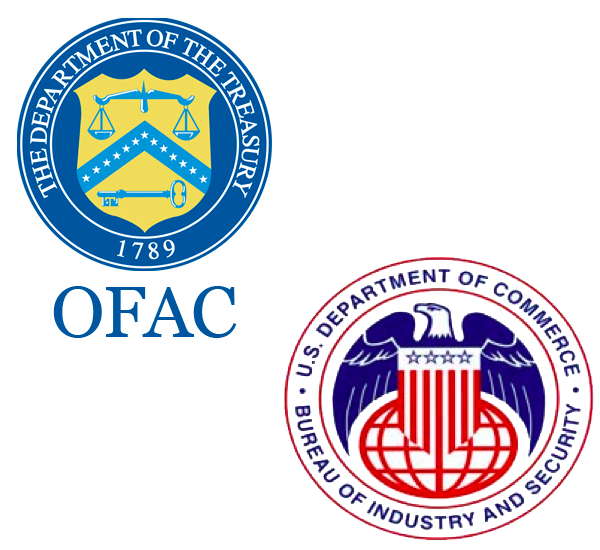
Conflict of Interest at the Highest Levels: Analysis of the Smuggling In...
Адвокат Максим Раков прокомментировал беспрецедентную ситуацию в израильском правоохранительном сообществе на радио РЭКА 1 февраля 2026 г.

On February 24, 2023, US Office of Foreign Assets Control (OFAC) has issued an amended Specially Designated Nationals and Blocked Persons List (SDN list) and, inter alia, a sectoral Determination that we have covered in our recent publication, thus updating its sanctions regime. The newly updated OFAC SDN list now includes even more major Russian banks, such as Bank Saint-Petersburg, MTS Bank, and Uralsib bank).
On February 27, 2023, US Bureau of Industry and Security of the United States Department of Commerce (BIS) has issued several documents that indicate the groups of goods and companies sanctioned by BIS itself. It is called the Implementation of Additional Sanctions Against Russia and Belarus Under the Export Administration Regulations (EAR) and Refinements to Existing Controls (Implementation).
How OFAC sanctions legal regime is different from that of BIS?
The OFAC sanctions regime operates within two main directions:
Unless otherwise authorized (e.g. by OFAC general or special licenses), transactions by US persons are prohibited if they involve transfers or otherwise dealing with an entity or individual listed on SDN list.
The sectoral sanctions impose prohibitions on US persons for certain specified transactions with entities identified on the SSI List. The property and interests in property of SSI list persons are not blocked, nor are transactions with them prohibited beyond these restrictions upon clarifications contained in separate documents called Directives 1-4:
Directive 1 prohibits engaging in any transactions, offering financing, or conducting any other activities related to debt or equity if such debt or equity was issued on or after the effective date of the relevant sanctions, and is associated with individuals or entities in the SSI list (within the time constraints specified in the Directive and based on when the debt was issued);
Directive 2 prohibits any transactions, financing, and otherwise dealing with (or for the benefit) of persons operating in Russian energy sector specified in the SSI list (within the time constraints specified in the Directive and based on when the debt was issued);
Directive 3 prohibits all transactions involving new debt with a maturity of longer than 30 days with sanctioned individuals and entities;
Directive 4 prohibits exportation and provision of goods and services (except for financial services), technology, or support of Russian deepwater, Arctic offshore, or shale projects, to persons listed in the SSI list.
Unlike OFAC, the BIS, a government body engaged in export issues and granting export licenses, operates within so-called Export Administration Regulations (EARs) and deals with manufacture, sale, distribution and export of commercial and dual-use items, technology, and information. Its sanctions are of purely economic nature.
BIS maintains two lists of entities and individuals that are subject to commercial bans, i.e. restrictions on export or reexport of designated groups of goods to:
To sum up, OFAC and BIS are different in a way that OFAC is responsible for general sanctions, restrictions, and licenses that permit certain actions towards sanctioned persons, while BIS deals solely with export policies and restrictions involving sanctioned parties.
To fully estimate the risks, one should check all of the above-mentioned lists and understand what restrictions and permissions are applied to the perspective or former counteragent being checked.
What purpose do these BIS documents serve, together with the above-mentioned BIS Implementation?
These BIS instruments allow to determine the exact product group of military, defense, and potential dual use that are now banned for export or reexport to or transfer within Russia or Belarus, and entities, transactions with whom are restricted.
These documents and lists also target multiple Italian, Swiss, UAE, Czech and Russian companies and individuals that assist previously sanctioned Russian companies to circumvent the sanctions by buying US-origin equipment for Russian military purposes, and that otherwise, directly, or indirectly, support Russian technological and energy military-related sectors. The new lists include companies that are involved in aerospace, services, electronics, even management, legal consulting, and financial services.
What does it mean when a person is found in OFAC SDN and/or SSI list? Can a non-US individual or legal entity deal with it?
If certain person is found the OFAC SDN list, that means that US persons (including individuals and entities controlled by such) are generally prohibited from dealing with them, and these persons’ property within US jurisdiction is blocked. The “OFAC 50% Rule” is also applied to the SDNs, meaning that the property of entities that are controlled by the SDNs on 50% and more is also blocked.
Does OFAC regime aims to sanction non-US persons dealing with the SDNs? Generally, OFAC sanctions also prohibit facilitation of a third-party transaction that would be prohibited by US sanctions if conducted by a US person, meaning that the non-US person cannot assist a sanctioned person to evade sanctions, and such person may be designated as well if it has provided a wrongful assistance to the sanctioned individual or entity.
Note that each SDN entry features an indication of the Executive Order (typically, the E.O. 14024 or E.O. 13685), pursuant to which this person was blocked and what respective restrictions are applied, whereas each SSI entry features an indication of the Executive Order (typically, the E.O. 13662 and its above-mentioned Directions 1-4) and respective provision of the US Code of Federal Regulations that provides for restrictions imposed on this person.
What does it mean when a person is found in the BIS Entity List? Can a non-US individual or entity deal with it?
BIS lists contain persons that are subject to certain export and reexport restriction. It means that certain goods (as per the provisions) cannot be exported or reexported to them without special licenses.
Generally, US persons are to request a license to supply to the person found in the BIS lists a category of goods specified there. Generally, for both BIS Entity List and BIS Denied Persons List persons there is a “policy of denial” or “presumption of denial” to supply them with “all items subject to the EAR”. If a US person intends to supply such an item, to this person it should request a special license pursuant to §744.11 of the EAR.
While this provision applies only to the US persons (or entities controlled by such), the non-US persons are encouraged to not to assist the sanctioned persons in evasion of these sanctions.